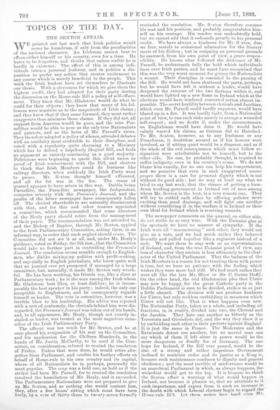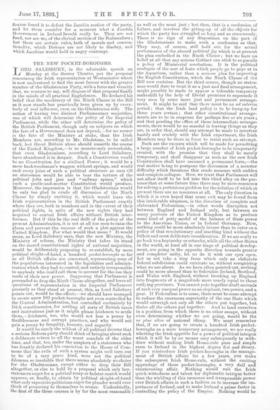TOPICS OF THE DAY.
THE SEXTON AFFAIR.
WE pointed out last week that Irish politics would never be humdrum, if only from the peculiarities of the national character. An Irishman cannot bear to efface either himself or his country, even for a time. He hates to be forgotten, and thinks that unless visible he is hardly in existence. The effect of this is among indi- viduals intense personal jealousy, and in politics a dis- position to prefer any action that creates excitement to any course which is merely beneficial to the people. This week the Irish leaders have set themselves to illustrate our thesis. With a cleverness for which we give them the highest credit, they had adopted for their party during the discussion on the Home-rule Bill a policy of self-efface- ment. They knew that Mr. Gladstone would do what he could for their objects ; they knew that many of his fol- lowers were sensitive as to the magnitude of Irish claims ; and they knew that if they came forward, they must rather exaggerate than minimise those claims. If they did not, all support from America would be gone, and the nine Par- nellites would be able to pose as the only true Nationalists and patriots, and as the heirs of Mr. Parnell's views. They therefore adopted a policy of silence, attended debates with an assiduity most creditable to their discipline, and voted with a regularity quite charming to a Ministry which has to defend a hopelessly illogical Bill, and finds no argument so entirely convincing as a good majority. Politicians were beginning to quote this silent union as proof of Irish contentment with the Bill, and electors to think that Irish Members could do business like railway directors, when suddenly the Irish Party went to pieces. Mr. Sexton thought himself affronted, and all the fat was in the fire. The cause of quarrel appears to have arisen in this way. Dublin being Parnellite, the Parnellite newspaper, the Independent, competes severely with the Freeman's Journal, and the profits of the latter newspaper have consequently fallen off. The clerical shareholds rs are naturally discontented with that, and for this and other reasons appointed a committee, which recommended that some directors of the Healy party should retire from the management of their paper. The recommendation was not attended to, and the Bishop of Raphoe, through Mr. Sexton, applied to the Irish Parliamentary Committee, asking them, in an informal way, to order that such neglect should cease. The Committee did not see it at all, and, under Mr. Healy's guidance, voted on Friday, the 9th inst., that the Committee would take no further part in controlling the Freeman's Journal. The resolution seems sensible enough to English- men, who dislike mixing-up politics with profit-seeking, and espf cially to English journalists, who know quite well that no journal ever yet prospered if managed by a large committee, but, naturally, it made Mr. Sexton very wrath- ful. Ho has been working, his friends say, like a slave at Parliamentary work ; he is the man among the Irish whom Mr. Gladstone best likes, or least dislikes ; he is incom- parably the best speaker in his party ; indeed, the only one acceptable to Englishmen, and he consequently regards himself as leader. The vote in committee, however, was a terrible blow to his leadership. His advice was rejected with a sort of contumely, the clericals behind him were dis- regarded, the Freeman's Journal was taken out of his hands, and, to all appearance, Mr. Healy, though not exactly in- stalled as leader, was treated as the most sagacious coun- sellor of the Irish Parliamentary Party. The affront was too much for Mr. Sexton, and he at once placed his resignation of his seat on the Committee, and his application for the Chiltern Hundreds, in the hands of Mr. Justin McCarthy, to be used if the Com- mittee, on consideration, refused to rescind the resolution of Friday. Unless that were done, he would retire alto- gether from Parliament, and confine his further efforts on behalf of Home-rule to his own country and its capital, where of all Nationalists he is, perhaps, personally the most popular. The coup was a bold one, as bold as if the striker had been Mr. Parnell, for to rescind the resolution involved the humiliation of Mr. Healy, and it succeeded. The Parliamentary Nationalists were not prepared to give up Mr. Sexton, and as nothing else would content him, they, after a five holm' sitting which must have been lively, by a vete of thirty-three to twenty-seven formally rescinded the resolution. Mr. Sexton therefore resumes his seat and his position, and probably congratulates him- self on his courage. His resolve was undoubtedly bold, but we cannot add that it redounds greatly to his personal credit. We have always a kindness for Mr. S .xton, due, we fear, mainly to occasional admiration for the literary- merit of his diction ; but in resigning on personal grounds; he assumed, from his own point of view, a grave respon- sibility. He knows what followed the deeMance of Mr. Parnell, he understands fully the hold which individuals have over Irish parties, and be must have recognised that this was the very worst moment for giving the Nationalists a wound. Their discipline is essential to the passing of the Bill. He would not have shattered the party, perhaps, but he would have left it without a leader, would have. deepened the rancour of the two factions within it, and would have lighted up a new flame in Ireland which at the elections would have rendered concerted action almost im- possible. The secret hostility between clericals and Jacobins, which even Mr. Parnell could hardly suppress, would have blazed up in a fire. It was hardly right, from a Nationalist, point of view, to run such risks merely to avenge a wounded self-respect ; and we doubt if, under the circumstances,. an Englishman would have done it. He would have calmly waived his claims, as Outram did to Havelock. To Mr. Sexton, however, as to any Irishman or any- Frenchman, it doubtless seemed as if his honour were- involved, as if sitting quiet would be a disgrace, and as if the whole of the evil consequences which must follow re- signation were attributable not to himself, but to the other side. No one, he probably thought, is required to suffer indignity, even in his country's cause. We do not. blame him exactly, for no one can help his temperament, and we perceive that even in such exaggerated amour propre there is a care for personal dignity which is not without its good side ; but we may at least say what we- tried to say last week, that the chance of getting a hum- drum working government in Ireland out of men among whom Mr. Sexton is the best, is a very remote one. They will try to outbid each other by offering policies more exciting than good drainage, and will fight one another without considering if in the warfare it is Ireland or their own ideal for Ireland which is receiving wounds.
The newspaper comments on the quarrel, on either side,. do not strike us as very wise. With the Unionist glee at the spectacle we have no manner of sympathy. If the Irish were all " niassacreeing " each other, they would not us a vote, and we bad much rather they behaved decently and pulled together like a regiment instead of a. mob. We want them to stay with us as representatives- of Ireland, and, from the true Unionist point of view, any loss of character they sustain is loss ultimately to the char- acter of the United Parliament. That the badness of the Irish Members is a reason for not trusting them with power is true, but we have no patience with the feeling which wishes they were more had still. We had much rather they were all like the late Mr. Shaw or Sir C. Gavan Duffy., On the other hand, the odd Gladstonian plea that Ulster may now be happy, for the great Catholic party in the Dublin Parliament is sure to be divided, strikes us as just a little absurd. The division will not produce kindness for Ulster, but only reckless outbidding in measures which Ulster will not like. That is what happens even now. The Nationalist Party, taken as a whole, and including all fractions, is, in reality, divided into two, the Clerical and the Jacobin. They hate one another as bitterly as the Terrorists and Girondists did, and the way they show it is by outbidding each other in their protests against England. It is just the same in France. The Moderates and the Extremists detest one another, but no mortal man cam say which of them if left alone in power would be the more dangerous or deadly foe of Germany. The one hope for Ireland, if the Bill ever passed, would be the rise of a strong and rather imperious Government inclined to maintain order and do justice as a King is, because such maintenance conduces to dignity and general obedience ; and the most terrible of misfortunes would be an anarchical Parliament in which, as always happens, the wickedest would get to the top. It is because we think the Sexton affair a warning of what would happen in Ireland, not because it pleases us, that we attribute to it such importance, and expect from it such an increase in the doubt with which Liberal electors begin to regard the Irnme-rule Bit Let them notice hoe, hard even Mr, Sexton found it to defeat the Jacobin section of the party, and let them consider for a moment what a Jacobin Government in Ireland !would really be. They are not fond, nor are we, of the clerical section of the Nationalists ; but there are certain rules, both of morals and conven- tionality, which Bishops are not likely to disobey, and which Jacobins would hold in angry contempt.



































 Previous page
Previous page